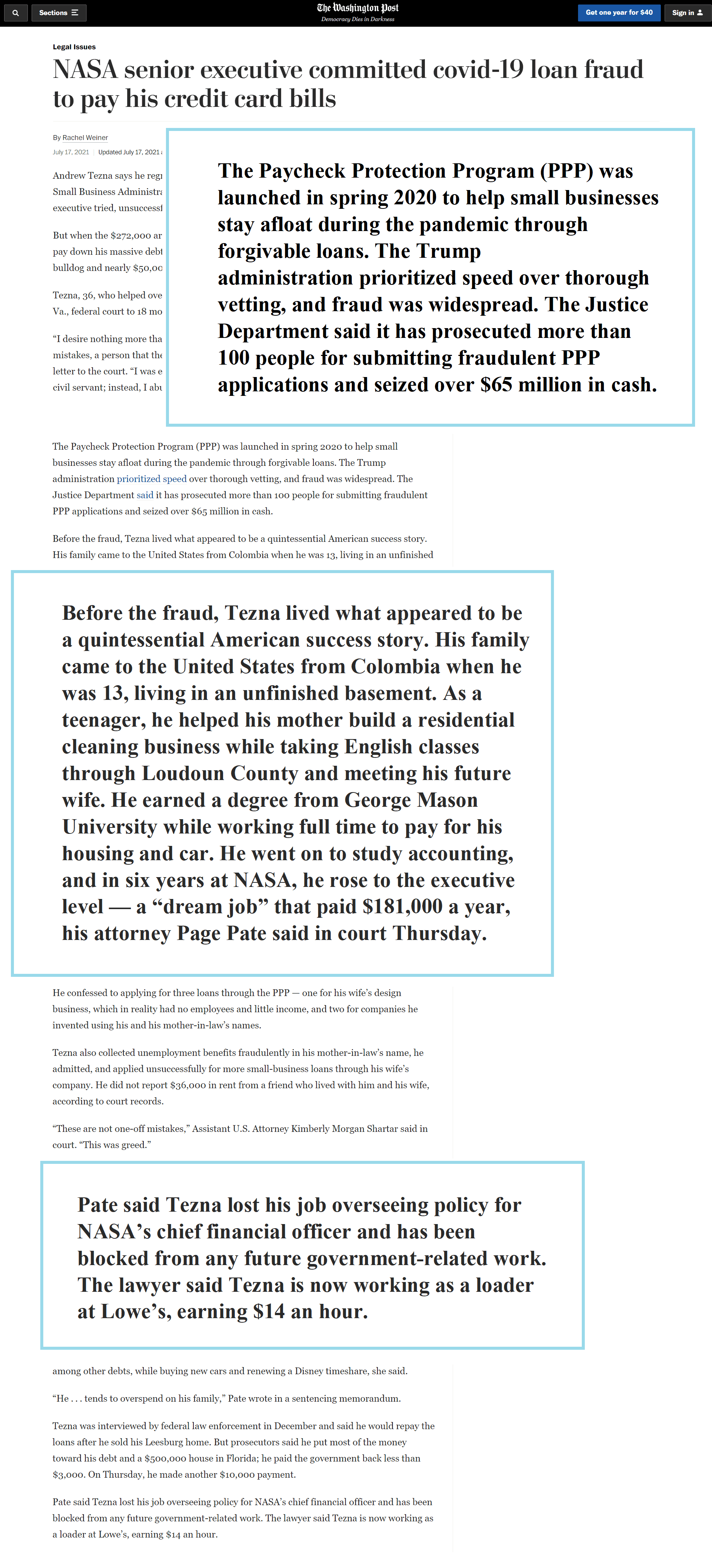Comprehensive Analysis Of The Final Ruling In PPP Fraud Cases
The final verdict in PPP fraud cases has garnered significant attention over the past few months. The Paycheck Protection Program (PPP), established under the CARES Act, was designed to provide critical financial relief to businesses impacted by the pandemic. However, the program has faced numerous challenges, primarily due to allegations of fraud and misuse of funds. Understanding the final ruling and its implications is essential for businesses, policymakers, and the general public.
As the legal proceedings conclude, the final decisions rendered by the court have profound consequences for those involved. This article provides an in-depth exploration of the PPP fraud case, covering the legal processes, key stakeholders, and lessons learned. Whether you're a business owner, a legal professional, or someone with an interest in financial fraud, this article offers detailed insights into the final ruling and its broader implications.
Throughout this article, we will examine the PPP fraud case comprehensively, including the investigation, court proceedings, and the final verdict. Additionally, we will analyze the broader consequences of this case on future financial programs and strategies for preventing fraud. By understanding the final ruling, we can better appreciate the significance of accountability and transparency in financial dealings.
Read also:Discover Tamilblasters New Link 2025 A Comprehensive Guide
Exploring PPP Fraud: A Detailed Perspective
Launched as part of the CARES Act, the Paycheck Protection Program aimed to assist small businesses grappling with the economic fallout of the pandemic. Despite its noble intentions, the program became a target for fraudulent activities. To fully comprehend PPP fraud, it's crucial to explore the program's structure and how it was exploited.
Defining PPP Fraud
PPP fraud encompasses illegal activities carried out by individuals or businesses to secure PPP loans under false pretenses. These activities include misrepresenting financial data, falsifying employee counts, and using loan funds for unauthorized purposes. According to the Department of Justice, thousands of investigations into PPP fraud have been initiated since the program's inception, underscoring the scale of the issue.
Key Statistics:
- More than $80 billion in PPP loans have been disbursed since 2020.
- Over 1,500 individuals have faced charges related to PPP fraud offenses.
- The average amount of fraudulently obtained PPP loans ranges between $500,000 and $1 million.
Forms of PPP Fraud
PPP fraud manifests in various ways, each with distinct legal and financial ramifications. Below are some of the most prevalent types of fraud identified in PPP cases:
- Misrepresentation of payroll data to inflate loan eligibility.
- Submission of inflated employee counts to secure larger loan amounts.
- Utilization of PPP funds for expenses not authorized under the program.
- Applying for multiple loans through different entities to "double-dip" on funds.
These fraudulent activities not only deprive legitimate beneficiaries of much-needed financial assistance but also erode public confidence in government aid programs.
Investigative Efforts and Legal Proceedings
The investigation into PPP fraud cases involved extensive collaboration between multiple federal agencies. This section delves into the investigative process, key participants, and the legal proceedings that culminated in the final ruling.
Read also:Discover Safe And Legal Alternatives To Movierulz For Your Streaming Needs
Contributions of Federal Agencies
The Small Business Administration (SBA) and the Department of Justice (DOJ) played instrumental roles in uncovering and prosecuting PPP fraud. These agencies worked closely with law enforcement to gather evidence, conduct interviews, and build robust cases against accused parties.
Key Agencies Involved:
- Small Business Administration (SBA)
- Department of Justice (DOJ)
- Federal Bureau of Investigation (FBI)
Stages of Legal Proceedings
The legal proceedings in PPP fraud cases followed a structured sequence, beginning with the indictment phase and concluding with the final verdict. Below is a summary of the key stages:
- Indictment: Formal charges were filed against individuals and businesses suspected of engaging in fraudulent activities.
- Trial: Evidence was meticulously presented, and both parties argued their respective cases in court.
- Verdict: Based on the evidence provided, the jury or judge delivered a final decision.
Analyzing the Final Verdict in PPP Fraud Cases
The final ruling in PPP fraud cases has established significant precedents for future financial assistance programs. This section examines the verdict, its implications, and the lessons learned from this landmark case.
The Court's Decision
Following months of thorough investigation and rigorous legal proceedings, the court delivered its final verdict on the PPP fraud case. The ruling underscored the critical importance of accountability and transparency in financial dealings. Numerous individuals and businesses were found guilty of fraud and faced severe penalties, including substantial fines and extended imprisonment.
Punishments and Sentencing
The penalties imposed in PPP fraud cases varied depending on the severity of the offenses. Below are examples of the penalties handed down:
- Fines ranging from $100,000 to $1 million.
- Imprisonment sentences of up to 20 years.
- Restitution orders requiring the repayment of fraudulently obtained funds.
Broader Implications of the Final Ruling
The final ruling in PPP fraud cases has far-reaching consequences for businesses, financial institutions, and policymakers. This section explores the broader ramifications of the ruling on financial programs and strategies for preventing fraud.
Impact on Businesses
For businesses, the final ruling serves as a stark reminder of the necessity to comply with program guidelines and maintain transparency in financial transactions. It also highlights the importance of implementing robust internal controls to deter fraud and misconduct.
Insights for Policymakers
Policymakers can glean valuable insights from the PPP fraud case to enhance the design and implementation of future financial assistance programs. Key takeaways include:
- Strengthening program oversight and monitoring mechanisms.
- Introducing stricter eligibility criteria and verification processes.
- Increasing penalties for fraudulent activities to serve as a deterrent.
Understanding the Legal Framework and Ensuring Compliance
The legal framework governing PPP fraud is intricate and encompasses multiple statutes and regulations. This section provides an overview of the legal basis for prosecuting PPP fraud and the importance of compliance.
Relevant Statutes and Regulations
The prosecution of PPP fraud cases is guided by several federal statutes, including:
- False Claims Act
- Bank Fraud Statute
- Wire Fraud Statute
These statutes provide the legal foundation for holding individuals and businesses accountable for fraudulent activities.
The Importance of Adhering to Guidelines
Compliance with program guidelines is paramount for businesses seeking financial assistance. Noncompliance can result in severe consequences, including legal action and financial penalties. Businesses should prioritize transparency and accuracy in their financial dealings to avoid potential pitfalls.
Strategies for Preventing Future Fraud
Preventing future instances of PPP fraud necessitates a multifaceted approach that incorporates technology, education, and policy changes. This section examines strategies for enhancing fraud prevention measures.
Technological Innovations
Advanced technologies such as artificial intelligence and data analytics can play a pivotal role in detecting and preventing fraud. By analyzing vast datasets and identifying patterns of suspicious activity, these tools can help flag potential fraud cases early in the process.
Promoting Education and Awareness
Education and awareness campaigns can empower businesses and individuals to identify and report fraudulent activities. Training programs and informational resources can equip stakeholders with the knowledge needed to understand the risks and consequences of fraud.
Public Discourse and Media Coverage
The PPP fraud case garnered extensive media coverage and sparked public discussions on issues of accountability and transparency. This section examines the media's portrayal of the case and the public's response.
Media Representation
Major news outlets extensively covered the PPP fraud case, shedding light on the magnitude of the fraud and the implications of the final ruling. Articles and opinion pieces delved into the legal, financial, and social dimensions of the case.
Public Sentiment
Public reaction to the PPP fraud case was diverse, with some expressing indignation over the misuse of funds, while others questioned the program's efficacy. The case highlighted the urgent need for greater transparency and accountability in financial assistance programs.
Conclusion and Call to Action
The final ruling in PPP fraud cases has set important precedents for future financial assistance programs. By comprehending the key elements of the case, including the investigation, legal proceedings, and broader implications, we can better appreciate the significance of accountability and transparency in financial dealings.
We encourage readers to share their thoughts and insights on this topic by leaving a comment below. Additionally, we invite you to explore other articles on our website for more in-depth analyses of financial fraud and prevention strategies. Together, we can foster a culture of integrity and transparency in all financial dealings.
Table of Contents
- Exploring PPP Fraud: A Detailed Perspective
- Investigative Efforts and Legal Proceedings
- Analyzing the Final Verdict in PPP Fraud Cases
- Broader Implications of the Final Ruling
- Understanding the Legal Framework and Ensuring Compliance
- Strategies for Preventing Future Fraud
- Public Discourse and Media Coverage
Article Recommendations


